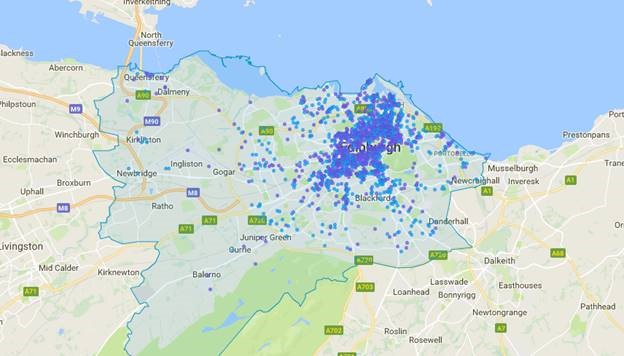There has been a rapid growth of short-term lets across Edinburgh which has resulted in demand for effective regulation and control of the short-term lettings sector.
Websites like Air BnB have enabled investors to advertise their short-term let properties online with ease and many investors are reaping the rewards financially of this market as Edinburgh’s tourism increases and so does the demand for suitable properties on a short-term basis.
In contrast however, this has caused a big division within local communities as key boxes become a common feature of traditional tenement buildings that are arguably not designed with short-term lets in mind, with many claiming that short-term lets are inconsistent with everyday tenement life. In addition, with more and more properties being snapped up by investors, this results in a lack of suitable housing stock not only for local long-term renters but also for first-time buyers.
This map from AirDNA.co shows how many properties are currently listed on Air BnB. There are currently 8,494 active rentals and we can now start to see how short-term lets are spreading outside the central Edinburgh areas (note that we can no longer clearly read ‘Edinburgh’ on the map centrally!). On average, each short-term let generates just over £100 per night.

Like other top European city destinations, the City of Edinburgh Council is introducing new plans to regulate and control the growth of websites like AirBnB in the city.
The Council has recently outlined minimum standards they would expect from a licensing regime for short term lets if permission was granted by the Scottish Government. This includes a licence being required for anyone operating a property on a commercial or professional basis (for at least 45 days a year). The licensing rules would also ensure any owners or operators were “fit and proper” and that certain safety standards were met. The council also wants the ability to “control or otherwise cap the number of properties licensed across the local authority area or in specific areas of the local authority”. This will be welcome news to those living in the Grassmarket or Old Town areas where the majority of short-term lets currently are based, but it will also be welcome news to those living a bit further out in areas such as Leith and Trinity, where Air BnB investors are also snapping up properties and converting them to commercial use for short-term financial gain.
The most recent Council report on short-term lets in Edinburgh highlights that “the concentration in certain areas is eroding the sense of community in some neighbourhoods”. It also adds that: “Regular use of any tenement flat as a short term let is inconsistent with tenement living, and often leads to anti-social behaviour and undue nuisance to other residents.”
At the moment, there is also a clamp-down by the City of Edinburgh Council planning department that view traditional tenement properties being let out short-term as a breach of planning control in some tenement cases. Many of those impacted by the noise and disturbance of holiday guests in their stairwell have had recent success with this.
So, what does all of this mean for investors?
- Any purchase with the intention of letting the property out short-term must be thoroughly researched and implications well considered. It is not simply a case of ‘purchase a property, upload the details online, reap the rewards’ anymore.
- You must be acutely aware of the clamping down of traditional tenement properties being used for short-term lets.
What does the recent news mean for long-term tenants and local residents and communities impacted by short-term lets in the City?
- Regulation is good news for the future availability of housing stock and local communities as the situation has managed to spiral.
In conclusion, short-term lets in Edinburgh has boomed in recent years but this has been at the expense of housing stock and has created division within the local community between investors and local residents.
Regulation will create a fairer environment where the needs of the local community are balanced with responsible investors being able to manage their properties effectively and efficiently – within the bounds of the law and regulation – creating a better balance.
